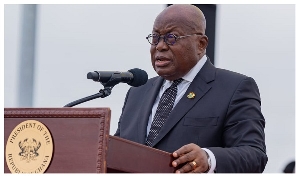Business News of Thursday, 17 May 2001
Source: GNA
Trade minister addresses exporters forum
Trade and Industry Minister, Dr Kofi Konadu Apraku, expressed concern about the refusal of some exporters to repatriate export proceeds back into the country despite existing incentives to enable them to do so.
He mentioned in particular the 100 per cent export proceeds retention scheme, which allows exporters to retain all their export, proceeds in foreign accounts in any local banks of their choice and disburse them when they so desire.
"It is, therefore, unacceptable for exporters to retain export proceeds in banks outside the country," the minister said, in a speech read for him at an exporters' forum in Accra.
The forum, organised by the Ghana Export Promotion Council (GEPC), brings together stakeholders from facilitating and promoting institutions, banks, tax authorities and the public to discuss pertinent issues affecting the export sector.
It also forms part of the council's periodic efforts to educate exporters on export-related policies and programmes and also find solutions to problems facing them.
The minister said the declining revenue from the traditional and non-exports sectors posed a great challenge to both government and the exporting community.
He, therefore, called for hard work to reverse the trend so that the country could be insulated against the unstable movements in the price of the country's primary exports.
In this direction, Mr Apraku said, government will support any efforts to improve the capacity of export companies to enhance their production to meet the needs of the competitive global market.
"To this end, government will lend its active support to the export-led poverty reduction programme being funded by the International Trade Centre and the United Nations Development Programme and co-ordinated by the GEPC," he said.
The export-led programme is to tackle poverty from a specific angle of international trade and involves the creation of export development capacities, encompassing product supply systems, among others.
Mr Apraku said to reap the benefits from the US market under the African Growth and Opportunity Act, an inter-institutional steering committee composed of his ministry, GEPC, CEPS, USAID, among others will look into and advise government on how Ghanaian companies can take advantage of the provisions under the Act.
"The US embassy will also hold a seminar later in the month to educate people on the Act."
He said the ECOWAS sub-region remains an equally important market to explore since it absorbs a greater percentage of Ghana's non-traditional exports, adding that the government will pursue with seriousness the fast track approach to the ECOWAS protocol adopted by Ghana and Nigeria to promote free movement of goods and services.
The minister said the international market is becoming more competitive to enter and the ability to compete will depend on how quickly exporters adapt to the ever-changing needs of the market.
"Environmental, health and other non-tariff barriers are becoming increasingly crucial in international trade," he said. "It behoves us all as key players in the export trade to constantly appraise ourselves of developments and to develop quick responses to these rapidly-changing situations if we are not to suffer further marginalisation in our relations."
Mr Tawiah Akyea, Executive Secretary GEPC, said decisions that would be reached at the forum will be part of the policy making process to enhance the capacity and the performance of the sector.










